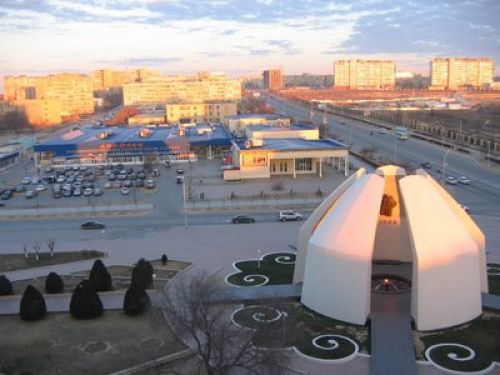
Aktau (Kazakh: Ақтау, Russian: Актау), formerly known as Shevchenko (Russian: Шевченко, 1964–1991), is one of the biggest cities of western Kazakhstan, and the country's main seaport on the Caspian Sea. It is located on the Mangyshlak Peninsula and is the capital of Mangystau Province. Aktau literally means "white mountain" in Kazakh, so named after the cliffs overlooking the sea. Population: 166,962 (2009 Census results);[1] 143,396 (1999 Census results).
Aktau is known for its unique block address system. The streets of the city have no names, and all addresses in Aktau consist of three numbers: the microdistrict (block) number, the building number and the apartment number. This is because Aktau was originally planned as a camp for the workers of the oil industry.
The territory of Aktau was once inhabited by ancient tribes of Scythians. Archeological finds in the area include old settlements and utensils. Aktau was founded in 1961 as a covert settlement, Guriyev-20, when development of uranium deposits was started.[3] In 1963 the settlement was open and gained status of a city. From 1963 to 1991, the city was named Shevchenko to honour the Ukrainian poet Taras Shevchenko, who was once exiled to this then remote location because of his political views. The name Aktau was given in 1991 as the Soviet Union collapsed and Kazakhstan gained independence.
Construction
Aktau was once the site of a nuclear power station. The BN-350 FBR went online in 1973, and closed in 1999. In addition to producing plutonium, BN-350 was also used to provide power and for desalination to supply fresh water to the city. The long-term plans of the Government of Kazakhstan include the construction of a new nuclear power station to be built near the current one. The current station is not considered powerful enough to supply the fresh water and energy needed when the new district Aktau-City is constructed, doubling the current area and size of the city.
Transport
Aktau has an international airport, a railway station, and a developed seaport.Buses and taxis are the principal means of public transport within the city.
In 2013 Kazakhstan will halt the transit of grain through the Black Sea and instead use Aktau where cars will go through the Caspian Sea and then through Azerbaijan and Georgia to get to Turkey. This decision is due to the opening of the railway connecting Georgia and Turkey, scheduled for early 2014.
Climate and leisure
Aktau experiences a desert climate (Köppen BWk), with dry summers and mild winters, with a mean January temperature of 0.5 °C (32.9 °F), and a mean July temperature of 25.55 °C (78.0 °F).
The beach season lasts from May to September, with an average sea temperature of 21 °C (70 °F). Aktau has both rocky hills and sandy beaches along the seashore. There are several modern resorts on the coast to the south of the city. The beaches of the Caspian shore are popular in the summer, due to the hot climate of the season. Tourists come mainly from other parts of Kazakhstan.



